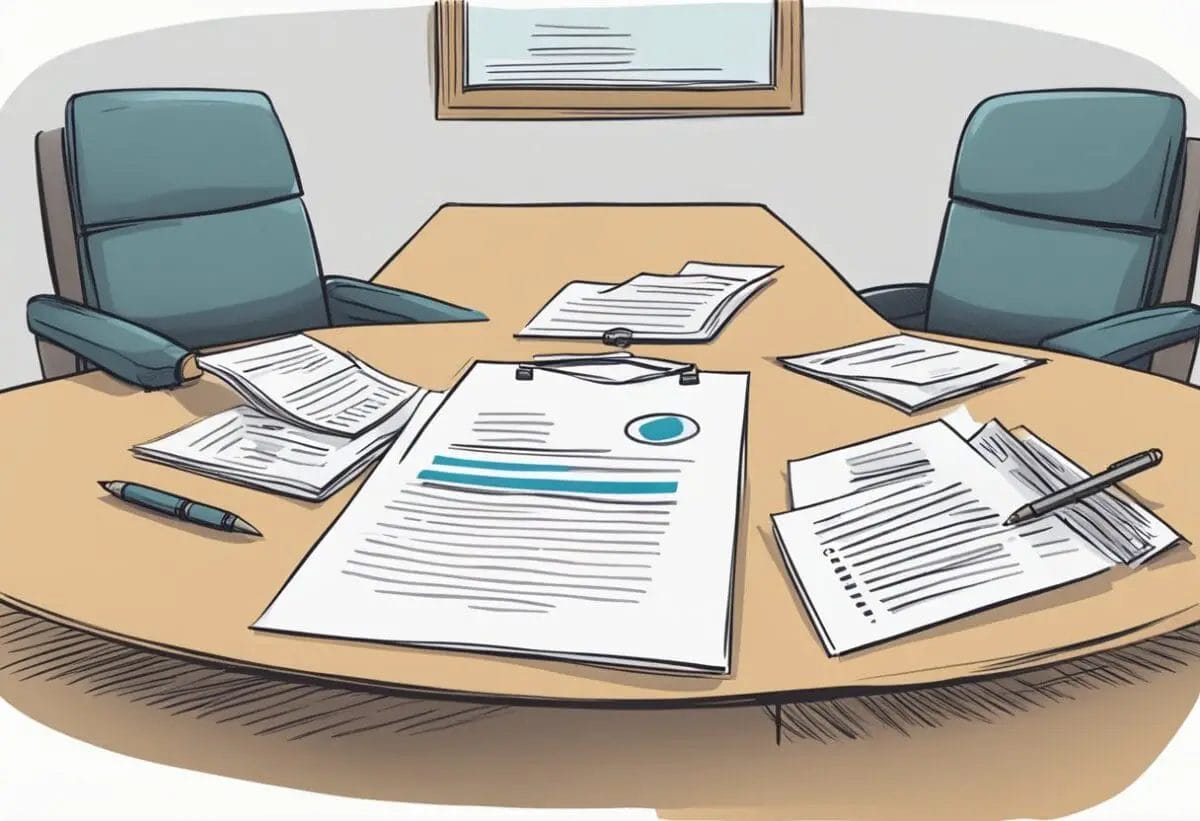Performance appraisals meeting offers both you (as the employee) and your manager the chance to assess your performance, reflect on your past achievements, and set goals for your future. During a performance appraisal meeting (aka. performance review meeting) it offers opportunities for:
- Engage in open dialogue about your work
- Receive valuable feedback from your boss
- Communicate and clarify expectations for your work
As you prepare for your performance review, understanding the types of appraisal questions and knowing how to respond professionally can help maximize the benefits of the meeting.

KEY TAKEAWAYS
- Performance appraisals offer a platform for meaningful dialogue and clear goal-setting.
- Being prepared with well-thought-out responses showcases your professionalism and dedication.
- Constructive feedback during an appraisal opens avenues for personal and career growth.
Types of Appraisal Questions
When you are having a performance review, you need to identify the various types of appraisal questions as it can help you guide to the types of answers your boss is looking for.
Behavioral Questions
Behavioral questions invite you to revisit your past experiences. Here, your storytelling ability shines as you recount specific examples that demonstrate how you tackled real-world situations.
Think of instances where you embodied key competencies such as leadership skills, problem-solving, or effective communication.
Reflecting on scenarios where your actions positively affected your team’s dynamics or the project’s outcome can illustrate your strengths—and how they translate to future triumphs.
- Example: Tell me about a time when you led a project that was successful.
Situational Questions
Situational questions require you to wear the hat of a strategist. You’ll face hypothetical scenarios demanding innovative solutions and astute decision-making.
These questions offer a glimpse into your thought process and how you’d navigate potential future hiccups.
Craft your responses to display your readiness for whatever may come, showing you’re not only equipped to handle the unexpected but also primed to turn challenges into victories.
- Example: How would you handle a sudden shift in project priorities?
Competency-Based Questions
Competency-based questions dissect your professional toolkit, probing into the depth of your skills and expertise.
You’ll need to illustrate your proficiency in job-specific areas, connecting your competencies with tangible achievements and goals met.
It’s your opportunity to flaunt the badges of your accomplishments and to articulate your career progression in ways that resonate with your aspirations and align with the company’s vision.
- Example: Can you provide an example of how you used your problem-solving skills to overcome an obstacle?
21 Common Performance Appraisal Questions with Example Answers To Each of The Questions

Effective communication and being well prepared to common appraisal questions can demonstrate your self-awareness, dedication to professional growth, and commitment to contributing positively to your work.
Working with our career experts, we’ve come up with a few example answers that you can refer.
However, each of the example answers should be seen not just as script you can just use, but as an inspiration to engage deeply with your boss and manager according to your own unique situation.
1. “How did you do on the goals set for you during your last performance appraisal?”
Example Answer: “I met and exceeded the sales target by 15% through strategic client outreach, though I’m still working towards improving my technical proficiency with our new CRM system.”
2. “What was your biggest achievement this year?”
Example Answer: “My biggest achievement was spearheading a marketing campaign that increased brand engagement by 30% across social platforms.”
3. “What are your short-term goals (1 to 3 years) with the company, and for your career?”
Example Answer: “Within the next year, I plan to earn a professional certification in digital marketing to enhance our team’s capabilities and contribute to the company’s online presence.”
4. “What are your long-term goals (5 years and more) with the company, and for your career?”
Example Answer: “Long-term, I aim to be in a leadership role where I can mentor younger staff and influence marketing strategies that align with company growth.”
5. “What is your career development goal?”
Example Answer: “My career development goal is to refine my project management skills to lead larger-scale projects efficiently and effectively.”
6. “What is the most challenging aspect of your work this past year and why?”
Example Answer: “Adapting to remote work was challenging, but it pushed me to develop stronger digital communication skills.”
7. “Which parts of your job do you most enjoy?”
Example Answer: “I particularly enjoy the collaborative brainstorming sessions where we get to bounce ideas off each other and innovate solutions.”
8. “Which parts of your job do you least enjoy?”
Example Answer: “Managing schedules is my least favorite task; however, with recent time management workshops, I’ve become more proficient at it.”
9. “How will you contribute to the company in the future?”
Example Answer: “By further developing my analytical skills, I intend to contribute more significantly to data-driven decision-making processes.”
10. “Do you feel that your current job and responsibilities are aligned with your future goals?”
Example Answer: “Mostly, yes. I’m gaining valuable experience in customer relations, which is building a solid foundation for my goal of leading the customer engagement team.”
11. “Are you happy with the company’s culture? What is the one thing that can be improved?”
Example Answer: “I appreciate our culture of innovation. However, I believe we can improve cross-departmental communication to enhance team synergy.”
12. “What do you think of the team as a whole? What is the one improvement you think we should make?”
Example Answer: “Our team is highly skilled. An area for improvement could be incorporating regular team-building activities to strengthen our collaboration.”
13. “What qualities do you feel the emerging leaders should possess?”
Example Answer: “Emerging leaders should be adaptable, empathetic, and proactive in recognizing the efforts of their team.”
14. “What would you do differently if you were a manager?”
Example Answer: “As a manager, I would implement a structured mentorship program to cultivate the strengths of each individual.”
15. “How are you measuring your progress?”
Example Answer: “I use a combination of key performance indicators and feedback from my peers and supervisors to gauge my progress.”
16. “Do you feel that you receive adequate feedback?”
Example Answer: “The feedback I receive is helpful, but I would welcome more regular check-ins for ongoing projects.”
17. “Which goals you were not able to meet and why?”
Example Answer: “One goal I didn’t meet was expanding into a new market segment due to shifts in market conditions. This has become a learning opportunity for future strategy adjustments.”
18. “Is there anyone or anything that is obstructing your performance in this company?”
Example Answer: “Not obstructing, but I do find that limited access to certain analytics tools is hampering the depth of my reporting.”
19. “What is the thing you need to improve on your performance?”
Example Answer: “I need to improve my public speaking skills to better represent our company at industry events.”
20. “Do you have everything you need to do your job?”
Example Answer: “Yes, though upgrading our current project management software would increase efficiency.”
21. “Do you have any questions for me?”
Example Answer: “Yes, I’m interested in understanding what new initiatives the company plans to undertake and how my role might evolve to support them.”
How to Be Professional in Your Responses During Performance Appraisal Meeting?

Professionalism in your responses can determine the success of a performance appraisal. This section will guide you through best practices ensuring your answers showcase preparedness, honesty, and a positive attitude.
1. Be Prepared For Potential Questions Asked
Before the appraisal, review your achievements and challenges.
- “Did you meet all your KPI?”
- “Is there any potential challenges ahead?”
- “Have you successfully completed a high-profile project?”
Familiarize yourself with your job responsibilities, your achievements, your challenges and confidently address each of the questions.
Preparedness reflects your commitment and professionalism.
2. Be Honest and Objective in Your Answer
Respond with honesty and objectivity. Acknowledge both your strengths and weaknesses.
- Be honest about your achievements and challenges.
- Stay objective and don’t let your emotions get into the way.
This approach facilitates constructive dialogue and shows you value collaboration.
3. Use Specific Examples For Each of Your Answers
Provide concrete instances of how you have fulfilled responsibilities.
- “I’ve completed the XYZ project within 3 months within the budget of $XX,000 and have an overall savings of XX%.”
- “On the previous sales meeting with XX client, I’ve obtained a business deal worth $XXX,000 and I am the top 10% in sales revenue.”
Specific examples demonstrate your competence and confidence.
4. Adopt Active Listening and Be Humble
Listen attentively to feedback.
Even if it is something you don’t agree, listen and understand where it comes from. Think from the other person’s perspective and wait for your turn to comment on what you’ve heard.
You listen to understand and not listen to rebuke.
Active listening fosters mutual respect and embracing humility offers you the key for professional growth.
5. Maintain an Open-Mind and Positive Attitude
Approach your performance appraisal with an open mind and a positive attitude.
View it as an opportunity to engage in open communication.
When done right, a performance appraisal is a rare opportunity for your professional development.






